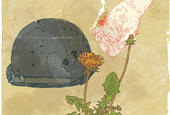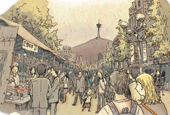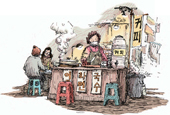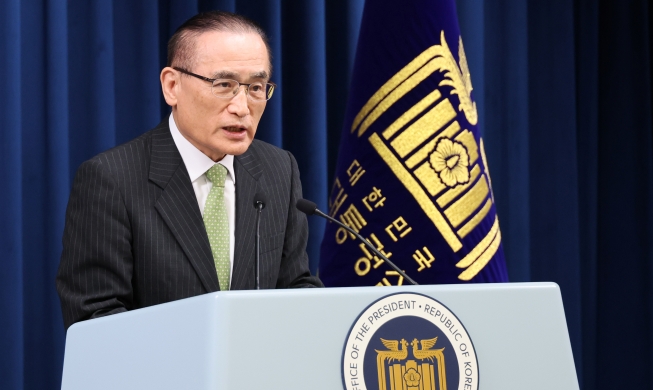View this article in another language
- 한국어
- English
- 日本語
- 中文
- العربية
- Español
- Français
- Deutsch
- Pусский
- Tiếng Việt
- Indonesian
Last month, the people of Seoul once again turned their city into a sea of red as they rooted for their team at the FIFA World Cup in South Africa. For one long term Seoul resident, that awoke memories of 2002 and a magical time that sealed his love for the country and its people.
This June, as Korea celebrated victory against Greece in its first World Cup match in South Africa, the energy coursing through Seoul brought back a flood of warm memories of when I first arrived eight years ago, just a few months shy of World Cup 2002. Granted, nothing compares to the energy of when the country is hosting the event, but Korea’s relentless enthusiasm was on display now just as it was then, with thousands — tens of thousands — of screaming fans clad in red shirts, united in spirit, filling the streets near City Hall and sharing in the excitement.
It was an unforgettable experience, and one that served as a pleasant reminder that, thanks to the nature of sport, for a brief moment in time all the world’s problems can be put aside, leaving just a throng of passionate fans cheering on their favorite team. I can’t think of a more opportune time to have come here. It was, though, quite a foreign experience for me to witness this level of feverish excitement.
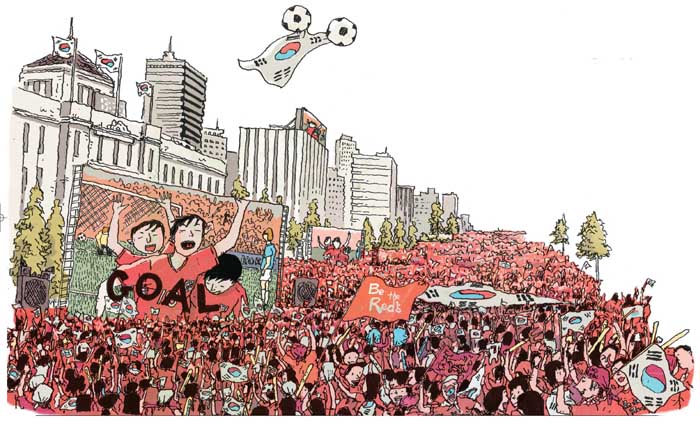
Football — or soccer as it is referred to in some parts of the world — just isn’t all that big where I come from. Instead, Canadians take their ice hockey very seriously. Yet, as riled up as fans can get inside a hockey arena, it pales in comparison to the sheer scope of open stadiums of Europe (and now Asia) housing over 60,000 screaming fans cheering on the home team. Add to that the boisterous hordes parading through the city waving banners and signs, and one gets a much clearer picture of just how colossal an influence soccer has over people.
In fact, I remember witnessing what looked to be a riot in Gangnam — crowds of people stomping on top of buses — yet was pleasantly surprised (and not a little relieved) to learn that everyone was just overjoyed at Korea’s place in the group standings. There wasn’t the slightest bit of aggression or hooliganism. That’s something I remember very distinctly. I would usually take to the streets with several friends and without fail one or all of us would get asked where we were from or how we were enjoying Korea. It was that level of genuine warmth that cemented my good impression of Koreans, and it has stayed with me to this day.
But I didn’t only watch the games from inside bars or celebrate in the streets. I had the good fortune of taking in three games in stadiums: Korea versus Germany, Spain versus Ireland and Korea versus Portugal. The latter I watched at Jamsil Stadium, in Seoul — though the game was actually taking place in Incheon. It was the deciding match of the group stages, and the excitement had gotten to such a degree that many large venues threw their doors open and let fans watch the action on vast screens.
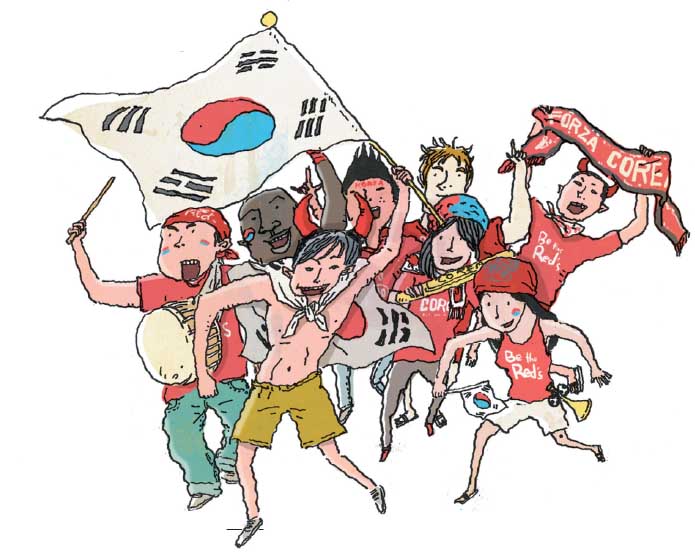
Supporters of all ages flooded in through Jamsil Stadium’s gates that day, raising noise levels to deafening heights. In our group were some of the only foreigners in the stadium on that particular day, and before we knew what was happening, we were whisked to the VIP section to get better views. I don’t think we were told the reason behind our sudden four-star treatment, or if there even was one. Looking back, I think it was simply a case of the host country wanting to share as much as possible with their foreign guests. It was, to say the least, a humbling experience.
The biggest game that year was, of course, the semi-final, when Korea faced Germany. Having made it so far, defeating both Italy and Spain, Korea stood on the cusp of a place in the final and a place in soccer immortality. For the life of me, I don’t know how I managed to snag tickets, but there I sat, surrounded by over 60,000 fans, rooting for the Taegeuk Warriors. Though, sadly, Korea’s glorious winning streak finally came to an end that night, with the Germans winning 1-0, as I left the stadium afterward, I couldn’t help but be struck by just how orderly everything was, and how good-spirited all the Korean fans were despite the loss.
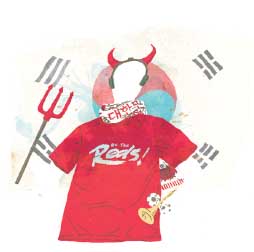
At that stage, it was hard to remember that just a few weeks previously, with demonstrations or other disturbances deemed a real possibility, the authorities had ramped up security measures in the capital. During the event, there was nothing of the sort. Not at the stadiums, nor in the streets. Plenty of clean-up needed, but nothing worse than you’d expect after a city-sized party. I was really amazed by that — that level of safety and genuine mutual respect. It was Korea’s chance to introduce itself to the world and it couldn’t have made a better impression.
At the time, when I related these stories to friends back home, many of them couldn’t even find Korea on a map. And while Korea remains less well known than its neighbors, the World Cup definitely raised its profile in their eyes, and gave them an idea that there was this distinct, fascinating culture in a country on the far side of the world.
For me, though, being here at that time was simply incomparable, like being a part of history. It’s left impressions that have stayed with me ever since. I will take a mental scrapbook of memories with me when I leave Korea, but that year — my first year — and that experience will be near the very top of the first page. It was, I am convinced, the central reason why I have remained in Korea until now.
As they say, first impressions are lasting impressions. And in this, I think I couldn’t have had a more apt introduction to the country I still call home. In its fervor and friendliness, the 2002 World Cup was the best possible introduction to Korea’s embracing spirit and incredible passion. Though Seoul changes as quickly as almost any city on Earth, it’s reassuring to know that its people remain anchored to their traditional roots of welcome and hospitality. Korea holds a great deal of interest for veteran travelers and newcomers alike. Many parts of the country are virtually untouched and just beckoning to be explored.
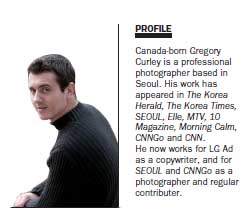
My reasons for coming here largely stemmed from a keen desire to get out of a comfort zone and quiet my nagging wanderlust. I hadn’t counted on falling in love with the culture here, nor did I ever anticipate the warm reception I would receive throughout my time here. I had initially planned to stay for one year, but I’m now well into my eighth. Though much of the reason for this is the opportunity and creativity I’ve found here, I would definitely say that much of it is also down to sheer luck at arriving at such a pivotal time. Korea was on the cusp of change in 2002, but still shows no signs of slowing down. Now, as then, I’m happy to be along for the ride.
By Gregory B. Curley | illustrations by Jo Seung-yeon | photographs by Kim Nam-heon and Kim Hong-jin
*The series of columns written by expats is about their experiences in Korea and has been made possible with the cooperation with Korea Magazine.
This June, as Korea celebrated victory against Greece in its first World Cup match in South Africa, the energy coursing through Seoul brought back a flood of warm memories of when I first arrived eight years ago, just a few months shy of World Cup 2002. Granted, nothing compares to the energy of when the country is hosting the event, but Korea’s relentless enthusiasm was on display now just as it was then, with thousands — tens of thousands — of screaming fans clad in red shirts, united in spirit, filling the streets near City Hall and sharing in the excitement.
It was an unforgettable experience, and one that served as a pleasant reminder that, thanks to the nature of sport, for a brief moment in time all the world’s problems can be put aside, leaving just a throng of passionate fans cheering on their favorite team. I can’t think of a more opportune time to have come here. It was, though, quite a foreign experience for me to witness this level of feverish excitement.

Football — or soccer as it is referred to in some parts of the world — just isn’t all that big where I come from. Instead, Canadians take their ice hockey very seriously. Yet, as riled up as fans can get inside a hockey arena, it pales in comparison to the sheer scope of open stadiums of Europe (and now Asia) housing over 60,000 screaming fans cheering on the home team. Add to that the boisterous hordes parading through the city waving banners and signs, and one gets a much clearer picture of just how colossal an influence soccer has over people.
In fact, I remember witnessing what looked to be a riot in Gangnam — crowds of people stomping on top of buses — yet was pleasantly surprised (and not a little relieved) to learn that everyone was just overjoyed at Korea’s place in the group standings. There wasn’t the slightest bit of aggression or hooliganism. That’s something I remember very distinctly. I would usually take to the streets with several friends and without fail one or all of us would get asked where we were from or how we were enjoying Korea. It was that level of genuine warmth that cemented my good impression of Koreans, and it has stayed with me to this day.
But I didn’t only watch the games from inside bars or celebrate in the streets. I had the good fortune of taking in three games in stadiums: Korea versus Germany, Spain versus Ireland and Korea versus Portugal. The latter I watched at Jamsil Stadium, in Seoul — though the game was actually taking place in Incheon. It was the deciding match of the group stages, and the excitement had gotten to such a degree that many large venues threw their doors open and let fans watch the action on vast screens.

Supporters of all ages flooded in through Jamsil Stadium’s gates that day, raising noise levels to deafening heights. In our group were some of the only foreigners in the stadium on that particular day, and before we knew what was happening, we were whisked to the VIP section to get better views. I don’t think we were told the reason behind our sudden four-star treatment, or if there even was one. Looking back, I think it was simply a case of the host country wanting to share as much as possible with their foreign guests. It was, to say the least, a humbling experience.
The biggest game that year was, of course, the semi-final, when Korea faced Germany. Having made it so far, defeating both Italy and Spain, Korea stood on the cusp of a place in the final and a place in soccer immortality. For the life of me, I don’t know how I managed to snag tickets, but there I sat, surrounded by over 60,000 fans, rooting for the Taegeuk Warriors. Though, sadly, Korea’s glorious winning streak finally came to an end that night, with the Germans winning 1-0, as I left the stadium afterward, I couldn’t help but be struck by just how orderly everything was, and how good-spirited all the Korean fans were despite the loss.

At that stage, it was hard to remember that just a few weeks previously, with demonstrations or other disturbances deemed a real possibility, the authorities had ramped up security measures in the capital. During the event, there was nothing of the sort. Not at the stadiums, nor in the streets. Plenty of clean-up needed, but nothing worse than you’d expect after a city-sized party. I was really amazed by that — that level of safety and genuine mutual respect. It was Korea’s chance to introduce itself to the world and it couldn’t have made a better impression.
At the time, when I related these stories to friends back home, many of them couldn’t even find Korea on a map. And while Korea remains less well known than its neighbors, the World Cup definitely raised its profile in their eyes, and gave them an idea that there was this distinct, fascinating culture in a country on the far side of the world.
For me, though, being here at that time was simply incomparable, like being a part of history. It’s left impressions that have stayed with me ever since. I will take a mental scrapbook of memories with me when I leave Korea, but that year — my first year — and that experience will be near the very top of the first page. It was, I am convinced, the central reason why I have remained in Korea until now.
As they say, first impressions are lasting impressions. And in this, I think I couldn’t have had a more apt introduction to the country I still call home. In its fervor and friendliness, the 2002 World Cup was the best possible introduction to Korea’s embracing spirit and incredible passion. Though Seoul changes as quickly as almost any city on Earth, it’s reassuring to know that its people remain anchored to their traditional roots of welcome and hospitality. Korea holds a great deal of interest for veteran travelers and newcomers alike. Many parts of the country are virtually untouched and just beckoning to be explored.

My reasons for coming here largely stemmed from a keen desire to get out of a comfort zone and quiet my nagging wanderlust. I hadn’t counted on falling in love with the culture here, nor did I ever anticipate the warm reception I would receive throughout my time here. I had initially planned to stay for one year, but I’m now well into my eighth. Though much of the reason for this is the opportunity and creativity I’ve found here, I would definitely say that much of it is also down to sheer luck at arriving at such a pivotal time. Korea was on the cusp of change in 2002, but still shows no signs of slowing down. Now, as then, I’m happy to be along for the ride.
By Gregory B. Curley | illustrations by Jo Seung-yeon | photographs by Kim Nam-heon and Kim Hong-jin
*The series of columns written by expats is about their experiences in Korea and has been made possible with the cooperation with Korea Magazine.
